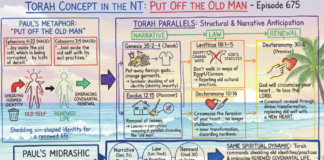This week’s reading from sefer Devarim (Devarim / Deuteronomy 3:23-7:11) Parashat Va’etchanan, Moshe is recapitulating (summarizing and restating) the main points during Yisrael’s journey from Mitzrayim to their present location (Beth Peor). Moshe requested to enter the Promised Land but God said to go to the top of Pisgah (a mountain summit in Moab) to see the land with his eyes only. These Scriptures again and again show us how God has defined who He is by what He has done for His people. Devarim 5:3 states that לֹא אֶת-אֲבֹתֵינוּ כָּרַת יְהוָֹה אֶת-הַבְּרִית הַזֹּאת כִּי אִתָּנוּ אֲנַחְנוּ אֵלֶּה פֹה הַיּוֹם כֻּלָּנוּ חַיִּים meaning 5:3 ‘The Lord did not make this covenant with our fathers, but with us, with all those of us alive here today. (NASB) Moshe goes on to say that אָנֹכִי עֹמֵד בֵּין-יְהוָֹה וּבֵינֵיכֶם בָּעֵת הַהִוא, the NASB translates as “I stood between the Lord and between you at that time,” it is interesting that the phrase בעת ההוא is indicative of Moshe standing between the people “in/at his time,” does this refer to the individual person by the use of the pronoun הוא? The Hebrew thesaurus shows us the synonyms for ההוא to include the word האיש (man). The text here shows us God’s continued perfect and absolute promise of His covenant coupled with the messianic expectation of the Messiah Yeshua personified in Moshe Rabbenu. Read More here.








